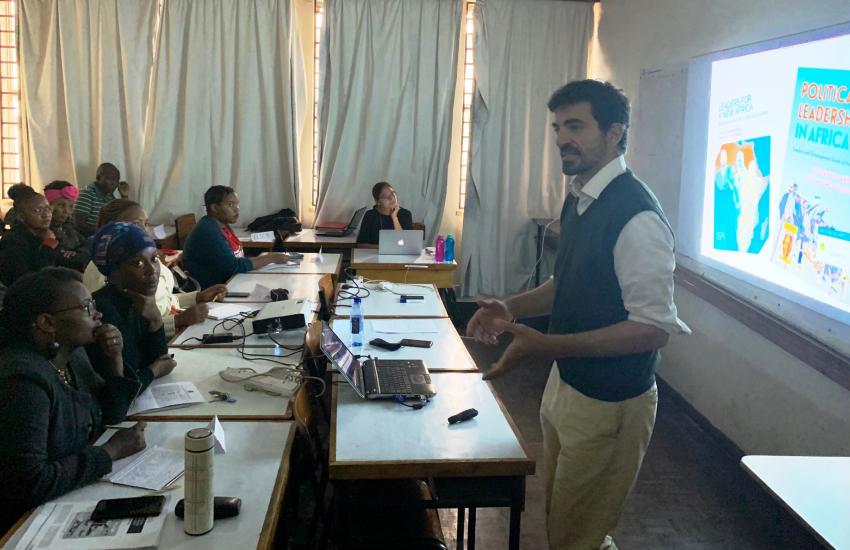Students Give Perspectives on Prof Giovanni Carbone’s Lecture
Prof Giovanni Carbone gave a seminar on leadership and development in Africa,
“Political leadership and development in Africa. The project, the dataset, the
findings.”The seminar is based on his forthcoming book, Political leadership in
Africa. Leaders and development south of the Sahara. It was delivered during TDS
503 lecture (Theory and Design of Development Research), which is taught by Dr
Radha Upadhyaya.
Master of Development Studies (MDEV) first year students, Mr Peter Mutiso and Ms
Mary Mwangi, attended the seminar. Here are their perspectives:
Peter Mutiso’s Perspective
The presentation was about leaders in African states, their kind of leadership style and
the corresponding development. It involved collecting comprehensive data on all 360
African heads of states since independence of each of the 49 states (1960-2018). The
data presented showed that indeed states with popularly elected leaders who adopted
more democratic approaches to leadership had higher economic growth, better social
welfare, and less corruption than the states whose leadership was more dictatorial.
Few exceptions included Rwanda and Ethiopia.
Three lessons were outstanding from the presentation. First, this presentation gave an
insight into how data in a constructivist ontology study could be captured and
quantified. Secondly, we learned about Dataset... a tool used to collect code and thus
quantify the abstractive history of the leaders. Thirdly, there was a revelation that
previously, no comprehensive data on African heads of states existed. This prompted
Prof Carbone and his team to come up with an in-depth data that may be availed at the
click of a button. The seminar again highlighted a challenge to African students- that
the continent has insufficiently documented its history, therefore leaving its enduring
story to be pre-dominantly told from a non-African perspective.
Mary Mwangi’s Perspective
The speaker focused on African political leaders and how leadership has changed
from 1960s to 2018 and how multiparty electoral systems change the dynamics of
leadership and the implications of multiparty democracy on development.
To address the above perspectives, Prof Carbone and his co-author Alessandro
Pellegata created a dataset based on 49 countries analysing 360 leaders in Africa. The
study’s overview of the African leadership dynamics shows increase in multiparty
elections in the Sub Saharan Africa from the 1990s.
The study focussed on presidential elections with only two special cases of
parliamentary or judicial elections, for instance in South Africa. The study showed an
increase in frequency of changes of leaders, shorter tenure in office, changes in modes
of leadership, for instance leadership via coup was 48% in 1990 and reduced to 18%
in 2018. Additionally, the study noted an increase in wins by opposition leaders.
The general finding is that different leadership dynamics affects development. The
Prof Carbone said leadership systems that were more democratic noted some
development growth unlike those with autocratic leadership systems. Therefore, In
spite of Africa’s electoral processes being fragile and imperfect they do matter and
should be supported and improved.


